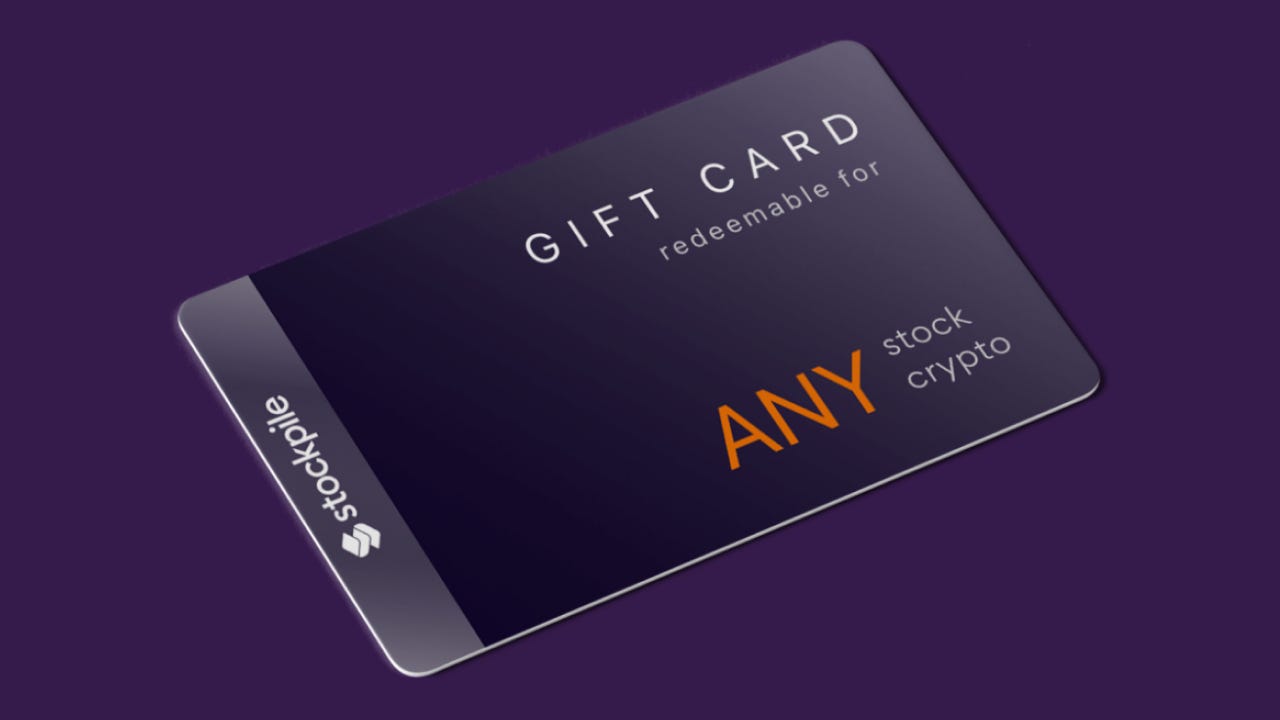Stockpile review 2024

If you’re looking to give a gift of stock or cryptocurrency to a child, Stockpile may be the platform for you. Stockpile allows you to buy gift cards that are redeemable for stock or crypto and lets you set up custodial accounts for a minor, making it easy to spark their interest in the world of finance.
Of course, anyone can still invest at Stockpile, but you’ll only get the basics with this stripped-down app. If you’re looking to give stock or cryptocurrency, Stockpile is an easy win, though users should note that holding assets here requires an ongoing monthly or annual subscription. So while you can give a gift that keeps on giving, the recipient will need to keep paying to access that gift after their 30-day free trial expires.
Stockpile does offer the basics, including some educational elements, but those looking for even a little bit more may need to step up to another investor-friendly broker such as Fidelity Investments or Charles Schwab, both of which also offer custodial accounts.
Best for
- Gifting shares of stock
- Introducing younger relatives to investing
- Ease of trading
Stockpile at a glance
| Category | Stockpile |
|---|---|
| Minimum balance: | $0 |
| Securities tradable: | Stocks, ETFs and cryptocurrency |
| Cost per trade: | No fees for trading or for purchasing gift cards. No fees for debit cards. Cryptocurrency has a 1-2 percent spread markup included in prices. |
| Customer service: | Via email |
| Account fees: | $4.95 per month or $50 annual account fee; $75 transfer-out fee; $5 inactivity fee per quarter on accounts that have less than $20 and are inactive for 90+ days. |
| Mobile app: | The Stockpile mobile app is available on the Apple App Store and Google Play Store |
| Promotion: | None |
Pros: Where Stockpile stands out
Easy to give stock and cryptocurrency
Stockpile’s biggest hook is the ability to give stock, and you can literally charge stock – or at least a gift card for stock – to your debit card. You can buy e-gift cards that can be loaded with values from $1 to $200. It doesn’t cost any additional fees to purchase gift cards for stock, and the recipient doesn’t pay anything to redeem the gift card. More recently, Stockpile had added the ability to give e-gifts of cryptocurrency.
With physical cards, options include a branded gift card (say, to buy shares of Apple or Disney) or an unbranded one. Either way you go, your recipient can buy whichever stock they want – no worries about getting the wrong gift. Your recipient can redeem the gift card on Stockpile by setting up an account (for a fee) and buying a stock or stocks. Then they’re a legitimate stockholder.
And if you’re giving stock to a child, Stockpile can be a great way to teach them about investing and why it’s valuable to own stock.
Fractional shares
Stockpile’s gift cards and its regular brokerage offering allow you to purchase fractional shares in stocks. So you don’t need to put enough credit on a card to buy a full share, which sometimes runs into the hundreds of dollars. Even if you give a $50 card, the full amount will be used to buy stock, whether that’s a full share or less than one.
And if you’re using Stockpile as your regular broker, you can take advantage of the same perk. It’s a good way to make sure that all your cash is working for you in the market.
Easy to set up and trade
While it focuses on gift cards, Stockpile allows anyone to apply for an account and trade stock. So if you want to use Stockpile as your broker, its easy-to-use interface makes that a snap. Trades are free, and you can use a debit card to fund the trade at no additional expense.
It’s surprisingly easy to set up your Stockpile account and get started. After a standard sign-up process asking for your personal details, you’ll be asked to link your bank account. From there you’re taken to a dashboard with a few options: buy stock, link a bank account and set up auto-deposit. A few links on the side allow you to redeem gift cards, invite friends and more.
The mobile app mimics much of the same process, and its clean layout makes it so easy to navigate. You can set up a watchlist quickly, search through available securities, read through the educational sections and buy gift cards. It’s super intuitive to use and explore.
To place a trade, you click “buy stock,” search through the available stocks and click on its icon. That brings up an info page with some of the stock’s vital details such as charts, financial info, a news feed of recent articles and a brief company profile. Click through that and then you’re asked to select the dollar value of your trade. Click “checkout” and your trade is done. Almost.
Stockpile doesn’t purchase (or sell) your stock right when you place the order, as a traditional broker would. Instead, it places all orders at one time in the market day to reduce its expenses. So you can’t set your trading price, and you’ll take the price on offer when the trade is made.
Nevertheless, it’s surprisingly easy to set up your account and trade with Stockpile, and children just starting out should have no problem finding what they want and buying it.
Access to custodial accounts
For some brokers, a custodial account is something of an afterthought, if they think of it at all. But access to custodial accounts is a defining feature of Stockpile. A custodial account allows a parent or guardian to own stock on behalf of a child until the child reaches the age of majority. It’s a convenient and quick way to get a child recipient set up with an account and legally have the stock held in their name. Ideally, the account will get them interested in investing.
Selection of stocks
Often in niche services like this, you’ll be stuck with a narrow range of stocks, so that you may not be able to buy the newest stocks. But Stockpile offers thousands of stocks and ETFs, so you’re likely to find what you’re looking for. You can quickly scan through the list of stocks and ETFs offered, or search by company name, stock ticker symbol or company industry.
Even if you don’t find a stock at first, you can request that it be added to the list of available stocks. So even that new hot tech stock will likely be available. However, Stockpile doesn’t add stocks trading below $3, penny stocks and other more obscure offerings.
Stockpile also offers more than 30 cryptocurrencies, including the most popular ones such as Bitcoin and Ethereum. It promises that it will be adding more over time.
Cons: Where Stockpile could improve
Subscription fee
In recent years, Stockpile switched up its business model, moving from a broker that you paid when you traded (or via gift cards) to one that charges a monthly or annual subscription. That shift occurred as the entire industry moved to a “no commission” model for trades. But Stockpile has to pay the bills, and that’s by charging a monthly or annual subscription for its services.
How much will that set you back? Stockpile charges a monthly fee of $4.95 or an annual fee of $50. Once the recipient of your gift card places an order for stock, they’ll receive one month of Stockpile for free, but then they’ll need to continue the subscription. Alternatively, Stockpile allows you to buy a gift card with a subscription of one, two or three years and includes a bonus credit of $5, $20 or $50 along with it, depending on the subscription length. That relieves your recipient of the obligation to pay a further amount in order to keep the gift you’re giving them.
Is that subscription worth it in a world where the best online brokerages don’t charge activity or subscription fees while still offering custodial accounts? You’ll have to decide.
Limited account types
Stockpile offers just two account types – individual taxable accounts and custodial taxable accounts. Given that Stockpile is focused on giving stock to beginners, that’s probably not a drawback. But investors looking to open other accounts (such as IRAs) have no options here.
Virtually every other major brokerage offers these and many other account types.
Limited functionality
The good news is that it’s actually easy to buy stock (or ETFs or crypto) on Stockpile, and you can virtually point and click your way to a trade with any dollar amount, as described above. The flip side of that ease comes at the cost of functionality and sophistication. So things you won’t find at Stockpile include:
- Any other security besides stock, ETFs and cryptocurrency (such as options)
- Limit orders or any other order type
- A trading platform
- Anything more than basic educational elements
So you can easily get a trade done here, but you may find other options such as Robinhood just as easy without all the drawbacks. Again, Stockpile is geared toward beginners and that’s reflected over and over in what’s on offer here.
Lack of features and tools
Stockpile is a fun way to help children start paying attention to investing. The clean layout of the site and the mobile app make it easy to navigate and otherwise use. The educational components on the app offer basic investing lessons, albeit still useful.
While these resources may suffice for a child, adult investors looking for more robust education and other tools will need to look elsewhere. Fidelity Investments and Charles Schwab are both exemplary in their educational features and Merrill Edge offers an excellent educational package, too.
Bottom line
Stockpile is focused on a specific niche and is trying to cater almost exclusively to that subgroup, so it doesn’t offer the same functionality as a typical online broker. Still, the app will likely deliver what you – or your child – needs, especially if you’re just getting started on an investing journey or trying to instill the value of investing.
But for nearly everyone else, particularly those looking to ramp up their investing in the near term or those looking for retirement account options, Stockpile won’t cut it. Good alternatives include Schwab and Fidelity if you’re looking for a “do anything” broker. Meanwhile, Robinhood is a solid pick for its easy-to-use mobile trading app. All three of those brokers also have no monthly subscription fees, yet another feature you won’t find at Stockpile.
How we make money
Bankrate is an independent, advertising-supported publisher and comparison service. Bankrate is compensated in exchange for featured placement of sponsored products and services, or your clicking on links posted on this website. This compensation may impact how, where and in what order products appear. Bankrate does not include all companies or all available products.






